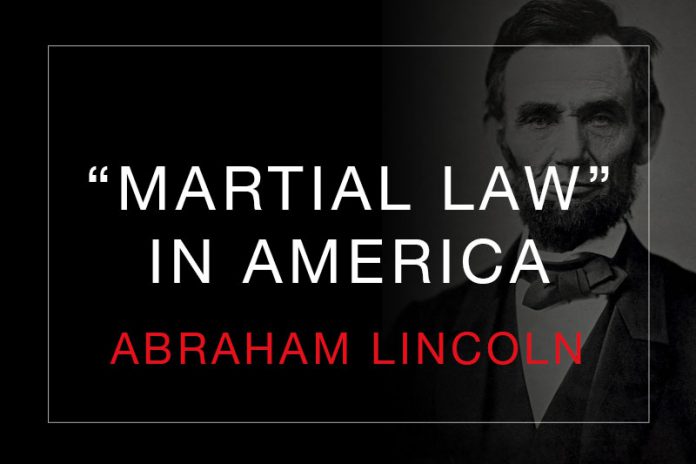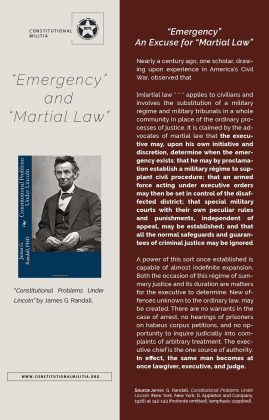Last Updated on October 1, 2021 by Constitutional Militia
“Martial law *** applies to civilians and involves the substitution of a military régime and military tribunals in a whole community in place of the ordinary processes of justice.” *** “A power of this sort once established is capable of almost indefinite expansion.”
Source: James G. Randall, Constitutional Problems Under Lincoln (New York, New York: D. Appleton and Company, 1926), at 142-143 (footnote omitted).
“Martial Law” Under President Abraham Lincoln
“Martial law” and “military government” in the strict senses set out in The Law of Land Warfare are being conflated in America today in the popular mind—and in much official usage as well—so that both of them are absorbed within the single rubric “martial law”. Actually, this amalgamation is not new. Nearly a century ago, one scholar, drawing upon experience in America’s Civil War observed that
“[m]artial law *** applies to civilians and involves the substitution of a military régime and military tribunals in a whole community in place of the ordinary processes of justice. It is claimed by the advocates of martial law that the executive may, upon his own initiative and discretion, determine when the emergency exists; that he may by proclamation establish a military régime to supplant civil procedure; that an armed force acting under executive orders may then be set in control of the disaffected district; that special military courts with their own peculiar rules and punishments, independent of appeal, may be established; and that all the normal safeguards and guarantees of criminal justice may be ignored.
A power of this sort once established is capable of almost indefinite expansion. Both the occasion of this régime of summary justice and its duration are matters for the executive to determine. New offenses unknown to the ordinary law, may be created. There are no warrants in the case of arrest, no hearings of prisoners on habeus corpus petitions, and no opportunity to inquire judicially into complaints of arbitrary treatment. The executive chief is the one source of authority. In effect, the same man becomes at once lawgiver, executive, and judge. Seizures and arrests may be made on suspicion by military men—men by who experience and habit of mind are accustomed to the unbending enforcement of orders and are often impatient of the restraints of civil government.”[1]






























